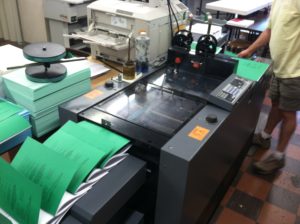 Though the Supreme Court cancelled its March argument session and extended deadlines for many cases, paper copy filing continues unencumbered here at Cockle.
Though the Supreme Court cancelled its March argument session and extended deadlines for many cases, paper copy filing continues unencumbered here at Cockle.
As Kimberly Strawbridge Robinson of Bloomberg Law reported yesterday, “It seems unlikely that the pandemic will spur a shift [at One First Street]. ‘Paper filings are still required,’ said Patricia McCabe, a high court spokeswoman. She added that a ‘substantially reduced number of staff are in the building to process the paper filings.’ Even with the recent introduction of electronic filing, most of the justices seem to be accustomed to and prefer reviewing filings in paper form.” Kimberly Strawbridge Robinson, Paper Filings, Relics Elsewhere, Endure at SCOTUS Through Virus (Apr. 2, 2020).
Robinson reached out to Cockle this week to discuss the effect of COVID-19 and social distancing on our day-to-day operations:
At Omaha-based Cockle Legal Briefs, the pre-printing work can be done remotely, said Andy Cockle, president of the family-run business and a third generation legal brief printer.
But one person “is in charge of printing and delivering the hard copy,” Cockle said. That person “is the only person allowed in the building, so he is virtually quarantined.” He still has to deliver the printed versions to FedEx for delivery to the Supreme Court and service parties, though.
Instant messaging platforms and nearly a century of institutional knowledge have allowed us to seamlessly transition from a heavily paper-reliant system to a virtually paper-free one.
The Court itself released opinions exclusively through its website and admitted lawyers to its Bar on written motions over the past two weeks. Members of the Court have also met in conference twice to discuss official business, with Chief Justice John Roberts presiding from the Court itself while other Justices participate by phone.
Don’t expect the Court to do away with the paper copy requirement anytime soon. From the advent of the electronic filing system to the its recent COVID-19 procedures, the Court has made clear that paper “remains the official form of filing.”